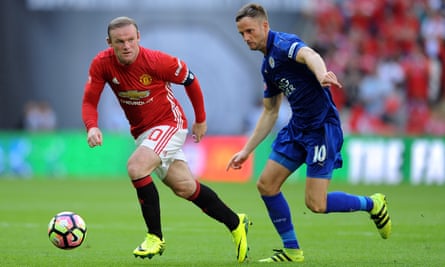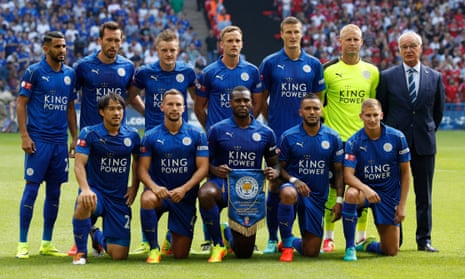In 1962, Ipswich Town won the league in their first season at the highest level. It was a remarkable achievement and they remain one of the three most surprising English champions since the second world war. In August 1962 they met the FA Cup winners Tottenham Hotspur in the Charity Shield, a game played at Portman Road, and lost 5-1. It was the beginning of a long deflation. Ipswich finished the season 17th, by which point their manager Alf Ramsey had departed to take charge of England.
No one is necessarily anticipating a similar decline for Leicester City but history suggests surprise champions are surprising for a reason and that reason is there are a lot of teams better than them. Nottingham Forest’s 1977-78 side, the other member of the trinity of shock champions, did finish second in 1978-79 but that example is highly unusual – and is explained partly by the genius of Brian Clough and partly be significant investment in players, including the signing of England’s first £1m player, Trevor Francis.
But that, of course, was a different time, before money had quite the influence it does now, and when the European Cup represented – at most – nine additional games across the season, many of which were likely to be against significantly inferior opposition. More recent surprise champions from across Europe have struggled the following season.
Blackburn Rovers, who won the Premier League in 1995, and Montpellier, who won the French league in 2013, found themselves in danger of being drawn into relegation battles by the December of the following season, although they recovered to seventh and ninth respectively. The three German surprises, Kaiserslautern (1998-99), Stuttgart (2007-08) and Wolfsburg (2009-10), came fifth, sixth and eighth.
The problems are manifold. Ipswich’s collapse came because sides worked out their tactic of withdrawing the left-winger, Jimmy Leadbetter, to operate in midfield. The parallel with Leicester is not exact – tactical ruses are exposed much more quickly in these days of blanket television coverage – but it did take a long time for opponents to cotton on to quite how devastating Leicester were on the break and, by the time they did so, Claudio Ranieri’s side were far enough ahead of the pack to keep playing as they had. Opponents will be wise to that now: no side in the opening weeks of the season will go to King Power and attack.
There is the issue of talent being lured away by bigger clubs and, in that regard, Leicester have done well to lose only N’Golo Kanté and the head of recruitment, Steve Walsh.
The Champions League – at least six games before Christmas – places a strain on the squad. As far as possible last season, Ranieri selected the same starting XI for every game. As he has said, he will have to tinker. Five new signings have added depth, but the danger is that they disrupt a dynamic that, last season, was unusually perfect.

And then there is the fact that last season was, to put it bluntly, a bit of a freak. Leicester performed creditably enough in their 2-1 Community Shield defeat by Manchester United but there were troubling signs, particularly in the goals they conceded. For the first, Jesse Lingard surged through the centre, evading a couple of reckless challenges. Last season there would have been no space to surge into, no chance for him to build up the pace that allowed him to jink by those tackles because Kanté would have been there. Maybe that is not entirely fair on Andy King, who took Kanté’s position. Maybe Kanté would have had an off day. But it seems significant the only goal Leicester conceded last season that featured a similar surge through the centre came from Salomón Rondón in the 2-2 draw in March when Kanté was unavailable with a hamstring injury. King or Nampalys Mendy will have to have an exceptional season if the France international is not to be missed.
But that in a sense was expected. It was obvious there would have to be adjustments to cope with the loss of Kanté. More troubling was the second goal as Zlatan Ibrahimovic outjumped Wes Morgan, who had been one of those leaping in to challenges in the buildup to the first goal. Many defenders will be beaten in the air by Ibrahimovic this season. He is physically imposing and an extremely good header of the ball but last season Morgan won an impressive 93 of 157 aerials attempted. Leicester’s system meant opponents were often reduced to whacking crosses into the box that he and Robert Huth cleared as a matter of routine.
To fail in that at such a key moment felt like a warning. Morgan played well above his ability last season and he was not the only one. Leicester had perhaps half a dozen players in the form of their lives simultaneously. That will not continue. There will be a regression to the mean.
Perhaps that mean is a little higher that would have been thought two seasons ago but the perfect storm of circumstance that carried Leicester to the title last year will blow itself out.

